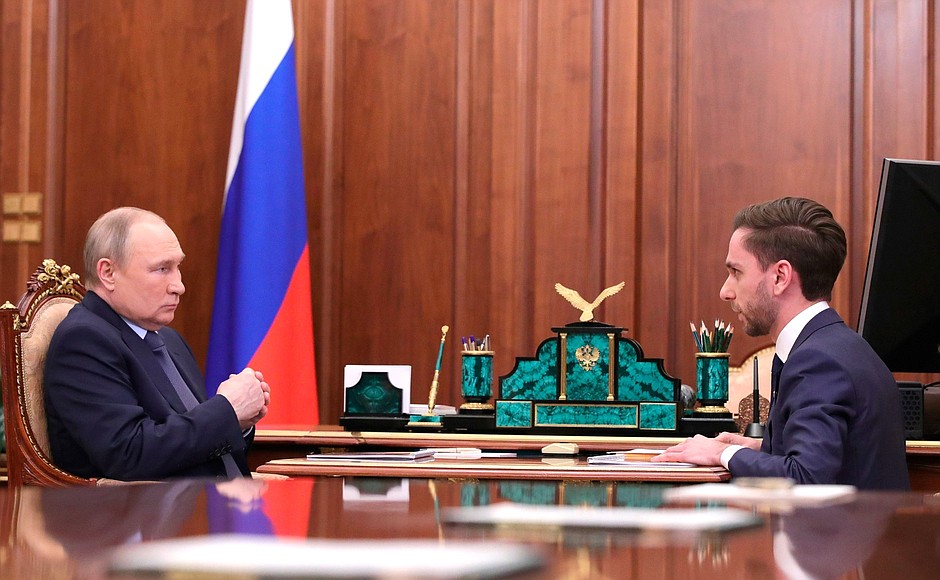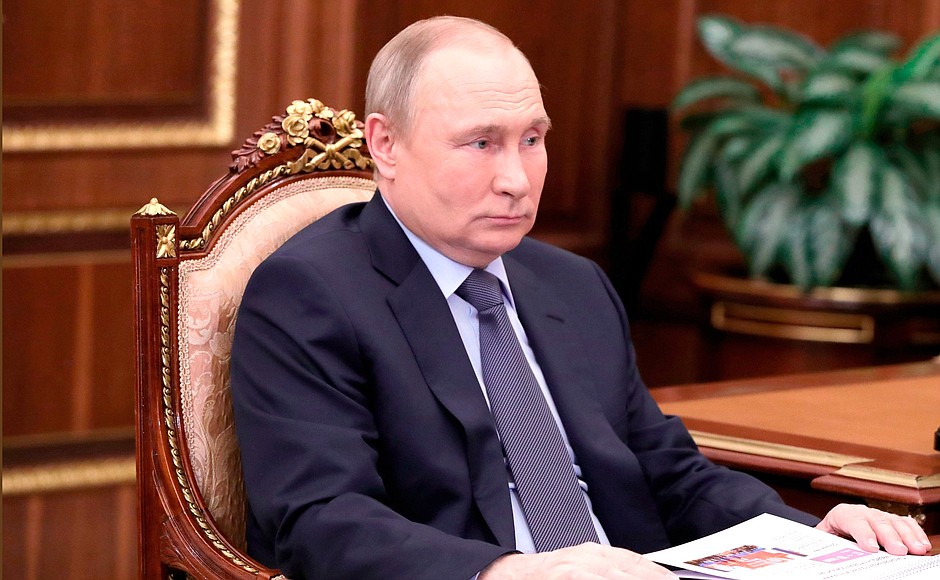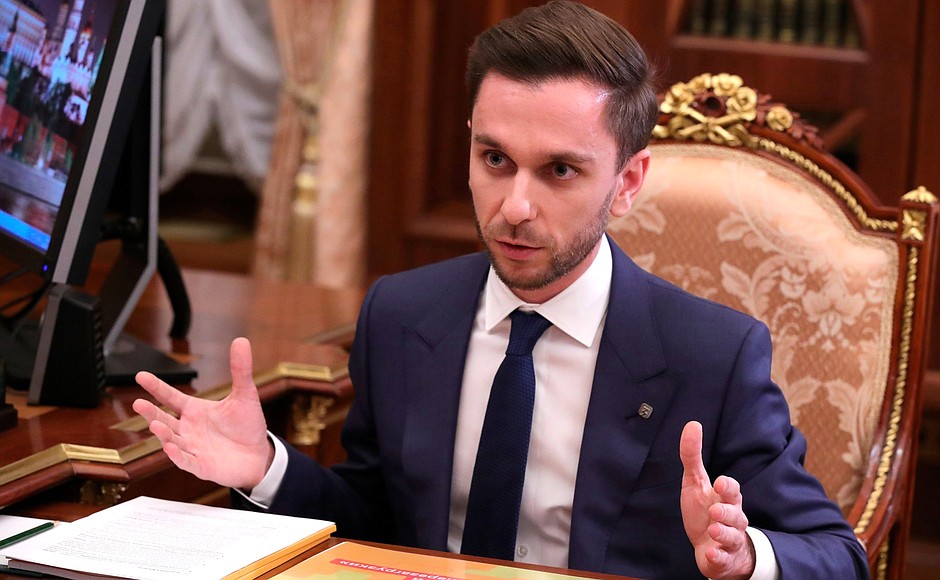Znaniye (Knowledge) Society, a public educational organisation, was established by Presidential Executive Order in 2015.
* * *
President of Russia Vladimir Putin: Mr Dreval, let’s talk about the revived Znaniye Society. How long has it been functioning in this new capacity?
Director General of the Znaniye Society Maxim Dreval: It may be symbolic that, as per your instruction, the society was revived one year ago.
Vladimir Putin: Are you satisfied with the results of its performance over the past 12 months?
Maxim Dreval: I must say it exceeded our boldest expectations. The most important thing is the young people’s response. We knew that there was great demand, but we could not expect to involve over 40 million people in a year, especially since we are dealing with complicated educational content in such areas as science, technology, Russian history, culture and geography.
Vladimir Putin: This turned out to be a good niche.
Maxim Dreval: Yes, the project has received over 400 million views, and this is what we were able to calculate. Today, the most popular subject has to do with new opportunities and new horizons that are opening up in all spheres. This is why we organised this event, and we are now holding it on a regular basis. Thousands of experts, scientists, businesspeople, cultural figures, artists and government officials spoke at schools, shared their knowledge with students and discussed new opportunities with them. A time of changes and challenges always spells new opportunities.
Speaking of opportunities, we realise that it is very important to rely on history and its experience and lessons. Consequently, the subject of history has always been and remains a key aspect.
Another project deals with the age of Peter the Great, marking his 350th birth anniversary. Under this project, the entire country will host a series of events called Russia is My History in local parks. Everyone will watch a cycle of lectures about Peter the Great that we are filming together with your aide, Vladimir Medinsky.
At the same time, it is important that Znaniye is not just launching its lectures and events trying to cover the entire country but that systematic work has been established with all ministries, large companies, universities, and public organisations. For example, now Znaniye attends all large events held in Russia, such as the St Petersburg Economic Forum and the Eastern Economic Forum. We organise joint thematic marathons. For example, we held a marathon with Roscosmos on April 12, and one on science and technology with Rosatom; we regularly hold joint events on ICT with the VKontakte [social network].
Going back to history and new opportunities, we dedicated large, perhaps the largest educational marathon, which will be held in May this year and which has already become traditional, to the topic of new opportunities, new horizons and the role of Russia in the world. Mr President, I would like to use this occasion to invite you to once again attend the Znaniye marathon and hold an open lesson for children. It will take place on May 17–19, for three days, across the entire country, and there will be some outstanding speakers. We would be very grateful if you could find time to hold such an open lesson.
Vladimir Putin: Thank you very much for the invitation. I will be sure to check my schedule.
Maxim Dreval: Thank you very much.
Speaking about cooperation with ministries, there is a very indicative and interesting project. We have launched a contest of educational plays, the best of which Znaniye will stage together with a professional director and, moreover, will help school and student theatre groups to hold them on their own.
This project was inspired by 17-year-old Liza Kochetkova. Together with other kids she staged a play on bulling. When watching this play we felt and realised how even amateur actors, teenagers, could show a very important topic so deeply. It became clear that Znaniye should definitely add such a format, too.
Another new format that was inspired by young people is gaming, because young people have always wanted an entertaining education process, the process of game. Last year we held an experimental online quiz for the entire country. It was the largest quiz in the history of Russia; it even made it to the book of records. Inspired by such results, we decided to hold a full-fledged championship that would be held all year round, and called it The League of Knowledge. Now we are adding various other formats of competitions, and we are even thinking of broadcasting the finals on television in order to further encourage the participants and once again show that knowledge has fundamental value for our country.
Naturally, the reboot would be impossible without our lecturers, who played a huge role in this work. Now there are more than 8,000 lecturers in Znaniye, and we expect this number to increase to 15,000 this year. At the same time, it all started with 300 people, Mr President. I am very grateful to them for their dedication and willingness to share their knowledge.
We have actively expanded the lecturer community, by first of all, adding teachers and instructors. But, you know, we noticed that not only professional lecturers, but also people in all fields were ready to share their knowledge. Moreover, young people also wanted real examples of the experience of professionals from various fields. We launched the League of Lecturers contest, which has helped us to find talented educators from all over the country. Over 10,000 people have already taken part in the contest. So we have found film directors, engineers and programmers to give lectures. For example, a military commissar became a semi-finalist. He reconstructs the history of soldiers’ heroic deeds during the Great Patriotic War, based on archival materials. So, we attract various lecturers.
Vladimir Putin: What was the contest based on? What did the winner get?
Maxim Dreval: The contest is held twice a year, so for six months, participants speak online to an audience made up of various age groups; they are judged by the young people and our experts. Then they take part in the semi-finals in their region, at our partner universities and at various venues, and for the final, they come to Moscow to speak in the main Moscow universities, and they are also assessed by experts and young people. This is a rather complex selection process.
Vladimir Putin: How many people reach the final?
Maxim Dreval: There are 100 finalists and 50 winners. And they all receive our grant support, training and tools to create and promote educational content. We consider it very important not only to find them and give them an audience, but also to really help them develop. In fact, we meet a lot of talented educators who, and this is very important now, want not only to share knowledge and speak, but also to create content that will be distributed on the internet to a large audience. I believe that now this is especially important, when there are so many fakes, when there is a lot of low-quality information.
Vladimir Putin: Certainly.
Maxim Dreval: We are trying to find out how to help more than fifty, more than a hundred such winners, including financially, so that they can create more content and reach audiences. Now we are also looking for such an opportunity; if you offer support, we will look more actively, we will find such an opportunity.
Vladimir Putin: Of course, objective, important and meaningful information, especially when delivered in a talented and fascinating way, is in great demand because Wikipedia alone is not enough.
Maxim Dreval: I totally agree.
Vladimir Putin: We know the quality of this information.
It is worth a lot when there are talented people, professionals whose opinion can be trusted. They are like live encyclopaedias.
Maxim Dreval: Absolutely. And, by the way, in fact, Znaniye is creating a knowledge database that in many respects will be able to serve as an alternative to Wikipedia, only with accurate data and reputable authors.
By the way, when we created the community of lecturers, young people wanted to see real examples of success stories about people that the country is proud of, the most prominent people in our country. This chimes with what you said at the first Znaniye marathon, when you mentioned that among the lecturers there should be CEOs, governors, Government members and the most prominent people from all areas of knowledge.
Thank you, Mr President, for your active involvement in the work of Znaniye and the open lesson you held in Vladivostok; your example inspired many people. I am happy that today we have governors, Government members and outstanding people from all areas among our lecturers. I hope that it will become a tradition, and those who have not joined us yet will do so soon.
By the way, it is also important that these meetings with such unique people are always a dialogue and not a monologue. We can see how important live communication is for young people, so that children can always ask their questions at all Znaniye events, whether online or offline.
Moreover, we provide this opportunity even at events that are not held by us. For instance, at the St Petersburg International Economic Forum, moderators put questions to the speakers that we had asked children in advance. That is, we give children the chance, through Znaniye, to pose questions to the leading experts at all the forums in our country. By the way, experts often tell us that it is sometimes more difficult to answer children’s questions than questions from their colleagues. I know what they mean, and, as a matter of fact, when I hear these questions I realise how sincere, smart and talented these kids are. I am proud of our young people.
I can also add that their questions essentially make them the co-authors of the content that Znaniye creates. They direct the experts and lecturers who give the knowledge that the children need right now.
Another interesting format is lecture tours. Last year, we tried to meet with a unique person at a unique place. For instance, Dmitry Rogozin spoke about space and the ambitious projects by Roscosmos at the Vostochny Space Centre. Also children spoke about music with Valery Gergiyev in the Mariinsky Theatre; Dmitry Artyukhov talked about the Arctic aboard an icebreaker in the Kara Sea. There have been more than 50 such lecture tours where kids have been able to meet lecturers, both in person and online, because all this is filmed and broadcast, and our young people can immerse themselves…
Vladimir Putin: As if they had visited the place.
Maxim Dreval: Exactly. We thought about how to surprise the young people when we held the second marathon at the St Petersburg Forum, and we moved our audience to unique places in St Petersburg, namely, the Mariinsky Theatre. It is a great way to involve young people. And for us it is very important that we don’t just show them a video or content about a particular topic, but rather captivate them so that they will be interested in studying the subject in more depth.
By the way, the project More Than a Journey has become a next step after the lecture tours format, which has helped young people to visit various places all over Russia and also to learn more about the history of the region, famous people who were born there and the region’s achievements. I think it is very important for young people, for us, and for the country as a whole, that young people get to know the country, its achievements and its prominent people.
In the past year, Znaniye has created over 600 hours of educational content. It is rather complicated and intellectual content. To create more and cover the entire country, we have opened nine studios in all the federal districts. This helps us to reach interesting people, lecturers from all over the country, and to create content about various regions.
At the same time because we want to give authors the chance to create their own content and help them to do this, we together with the Ministry of Science and Higher Education and the Ministry of Education, are launching media laboratories at universities. These will become a platform where authors can create their own content with the use of the laboratory equipment, and receive help from our team and, very importantly, with access to the huge library of Znaniye and our partners’ content create their own videos and films. We give them access to this free of charge, because creating educational content is the most important thing.
We want dozens or maybe even hundreds of such media laboratories to be launched this year and next. I am sure that there will be much more content, it will be created not only by Znaniye but by a huge number of such educators.
We’ve even gone into professional content – into cinema, and we’ve just launched a project called Smart Films, which is running a documentary scripts competition. I hope that more than 30 new documentaries will appear this year.
We help aspiring documentary filmmakers, including with an educational programme. And most importantly, besides the grant support from partners that encourages filmmaking, we have the backing of certain platforms and cinemas so that these films can really find their audience.
Vladimir Putin: What do you use as a basis, where are you carrying this out?
Maxim Dreval: The competition takes place all over the country. The best of them come to Moscow, and we introduce them to the leading film studios. Budding documentary filmmakers undergo a training programme there and choose a studio where they want to film. We have a good partner: Gorky Film Studios. They are always ready to help everyone to produce these documentaries. But teams can choose any studio, as long as the script wins and the film is a documentary, an educational one. All these films are guaranteed to find their audience, because both online and offline cinemas are with us.
Vladimir Putin: Who helps you to work with the studios?
Maxim Dreval: The Ministry of Culture, the Ministry of Education and the studios all responded. It didn’t take much persuasion. Actually they really needed it. And it is very significant that many companies have supported it in terms of grants. These include commercial companies, such as VK, which gladly supported our initiative, Yandex, Sberbank and the Internet Development Institute Foundation. A lot of organisations supported this initiative because, firstly, many of them also own cinemas, and they are interested in these kinds of films emerging, and the idea of enlightenment is not alien to them, in principle. The executives of these companies are our lecturers.
Vladimir Putin: Understood. What else needs to be done to support this project?
Maxim Dreval: Your participation as a lecturer always gives a very strong impetus.
The second most important aspect, in my view, where we can and should expand, is grant support for lecturers and educators, enabling them to create content, and we are now looking for means to expand this kind of grant support.
Another thought, or rather a request from the audience and our thoughts on this. They often ask us why our content has not yet appeared on television. Maybe we really should think about getting films, game formats, lectures, content about geography, about the country’s history appear on TV channels more often. If you support us, we will work with our colleagues from the TV channels so that our educational content appears on television too.
Vladimir Putin: Agreed.
Maxim Dreval: Thank you very much.
<…>


